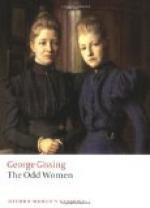For all her self-study, her unflinching recognition of physical and psychical facts which the average woman blinks over, Mary deceived herself as to the date of that final triumph which permitted her to observe Rhoda Nunn with perfect equanimity. Her outbreak of angry feeling on the occasion of Bella Royston’s death meant something more than she would acknowledge before the inquisition of her own mind. It was just then that she had become aware of Rhoda’s changing attitude towards Everard Barfoot; trifles such as only a woman would detect had convinced her that Everard’s interest in Rhoda was awakening a serious response; and this discovery, though it could not surprise her, caused an obscure pang which she attributed to impersonal regret, to mere natural misgiving. For some days she thought of Rhoda in an ironic, half-mocking spirit. Then came Bella’s suicide, and the conversation in which Rhoda exhibited a seeming heartlessness, the result, undoubtedly, of grave emotional disturbance. To her own astonishment, Mary was overcome with an impulse of wrathful hostility, and spoke words which she regretted as soon as they had passed her lips.
Poor Bella had very little to do with this moment of discord between two women who sincerely liked and admired each other. She only offered the occasion for an outburst of secret feeling which probably could not have been avoided. Mary Barfoot had loved her cousin Everard; it began when he was one-and-twenty; she, so much older, had never allowed Everard or any one else to suspect her passion, which made her for two or three years more unhappy than she had ever been, or was ever to be when once her strong reason had prevailed. The scandal of Amy Drake, happening long after, revived her misery, which now took the form of truly feminine intolerance; she tried to believe that Everard was henceforth of less than no account to her, that she detested him for his vices. Amy Drake, however, she detested much more.
When her friendship with Rhoda Nunn had progressed to intimacy, she could not refrain from speaking of her cousin Everard, absent at the ends of the earth, and perchance lost to her sight for ever. Her mention of him was severe, yet of a severity so obviously blended with other feeling, that Rhoda could not but surmise the truth. Sentimental confession never entered Miss Barfoot’s mind; she had conquered her desires, and was by no means inclined to make herself ridiculous; Rhoda Nunn, of all women, seemed the least likely to make remarks, or put questions, such as would endanger a betrayal of the buried past. Yet, at a later time, when pressing the inquiry whether Rhoda had ever been in love, Mary did not scruple to suggest that her own knowledge in that direction was complete. She did it in lightness of heart, secure under the protection of her forty years. Rhoda, of course, understood her as referring to Everard.




